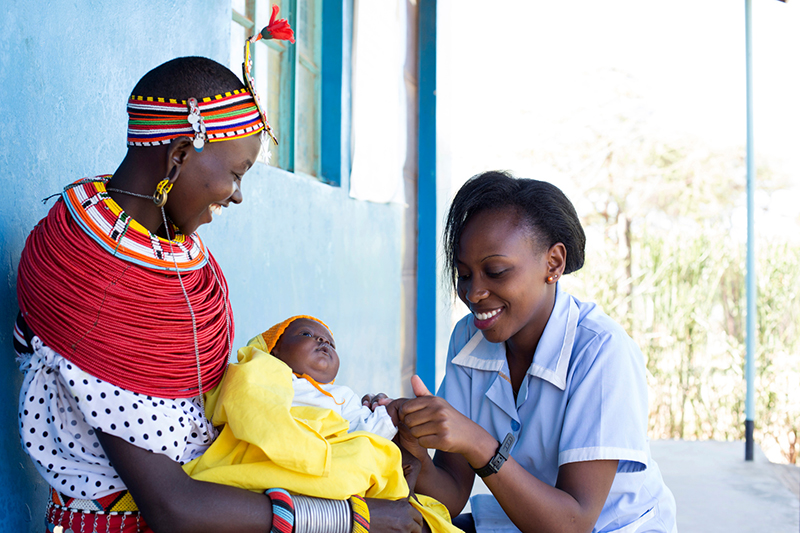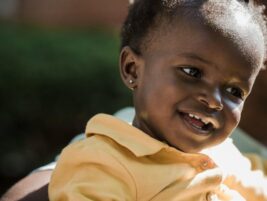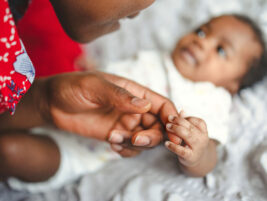Perspectives assistant editor Salisha Maharaj sat down for an interview with June Manala and Rachel Makoni to hear more about the work they are doing in Zimbabwe through a project called Stardust. Founded in 2007 by Judy Davies, the Stardust project has continued its legacy in providing contextually relevant support and professional development to organisations and individuals working with infants and their caregivers across various public and NGO sectors.
Getting to know Rachel and June
Salisha Maharaj: Please tell me about yourselves and the work that you are involved in.
Rachel Makoni: I am registered as an educational psychologist and have been working in this field since 2016. I started my profession as a teacher. If I think about my formative years, whatever I was going to do with my life was going to be something around changing and improving children’s lives … sometimes you’ll have a client come in at 12 years old or 10 years old and you have a parent and take a history and you realize oh this story began a lot earlier…and that got me thinking about the level of intervention. So being a psychologist seeing children and adolescents and then hearing the early stories is what grew my curiosity about their beginnings, and that is what brought me to the work of infant mental health.
June Manala: I want to start with the fact that I was raised by my grandmother and a great-grandmother surrounded by a network of three generations of elders and cousins … So you can imagine that one of the things that would be on my mind was my parents and other relationships. I am married with four children and have grandchildren, three of which are infants.
My career began as a teacher of Geography, a subject I like very much but not the teaching profession. Two years later, I joined the school psychological services of the Ministry of Education in Zimbabwe. Among other tasks, I translated for the then Principal Educational Psychologist as people would come in from all over the province with their children with special education needs, looking for school placement … It often struck me that parents were relieved and happy once their children were assisted. I wanted to be part of that as a psychologist. At that time, post-independent Zimbabwe made school psychological services accessible to black schools. Then I decided to be an Educational Psychologist, thus commenced studying psychology at The University of South Africa, UNISA. And then, um, my route took me here to South Africa for postgraduate studies. I interned and worked for a Psychoanalytic oriented parent and child counselling organization where we offered play therapy, family, and individual psychotherapy, as well as in-servicing schools and communities. I remember the Parent Intake interview tended to focus on early beginnings experiences such as pregnancy, birth, emotions, attachment etc., to understand presenting concerns.
Gradually I came to realise that most of the pain that was in the room was about relationships that didn’t go well, across cultural groups. And then obviously working with young children and adolescents, as you hear more and more that there are services available for younger children, you go down to early years, to train in it. That is when I came to parent-infant work training through Ububele African Psychotherapy Training Trust which became a professional home for me and other colleagues.
Being founding members of the PIP Reading Group, the natural path was to form The Gauteng Association for Infant Mental Health and I was its interim Chairperson.
In one of these conferences, I remember meeting Judy Davies a fellow Zimbabwean in 2013. We both hold a special investment in babies and Infancy, she invited me to join her to develop Stardust work.
Stardust…finding a place to house infancy and building relationships to support infant mental health work in Zimbabwe.
Salisha: The next natural question then is how was Stardust formed and what does it entail?
June: There is a funder Mr Perren … Judy [Davies] had previously set up some under Fives clinics in the NHS and has quite a network of connections and she’s a connector in my experience, herself, and so was offered funding. Perhaps Judy and the funder will one day tell their story … This was in 2005, thinking about the needs of infants in crisis and helpful ways of responding to the needs during Zimbabwe’s major socio-economic changes. She did the groundwork for finding places to house infancy at the time and it was not easy. Eventually, she was received at two counselling and training institutions, as well as a helpline organisation in both Harare and Bulawayo – the two big cities in Zimbabwe. In Bulawayo, she held presentations for medical staff about the importance of the Infancy period as a foundation for infant mental health and that led to one organisation setting up a counsellor in the pre and postnatal departments. Two flagship texts were used to ground the work, for example, Graham Music (1) and Sue Gerhart’s (2) books, you know, it’s a lot about all this neuroscience of attachment and so forth. I will pause here, and Rachel can come in.
Rachel: So having seen children who are a little bit older and sort of wondered about the beginnings of their lives and you know, how interventions could possibly be a lot earlier and got me into the Masters at Stellenbosch [Mphil in Infant Mental Health]. And, you know, I was quite interested in really going full out into that sort of type of work. And then I met June a few years ago, and she told me about the work in Zimbabwe and Stardust. She told me about the project her and Judy were doing at the time, and I mean it is something in my heart … Sure thing, being able to do things back home.
There are a lot of rich practices of mental health and babies and beginnings, but there are also gaps … as a country, we have been through a lot, and so we have almost every 10 years, there are these huge waves of challenges. So in 1990, for example, it would have been the HIV AIDS pandemic. In 2000, it was an economic crisis and in 2010 and 2020, more economic and political challenges. And then there are things like waves of people, either mums and dads, parents dying, and what are the babies left with? How are they left to think and be in the world? And then maybe the next wave is mum’s and dad’s leaving the country and leaving their children with grandparents and extended families. And what does that mean? Or at the moment, parents having to go back to Zimbabwe and the adjustment challenges for all the children, so all of this was like a part of a [red] flag. I guess the rationale for doing the work in Zimbabwe, is that there’s a big need. And you know, being someone who grew up in Bulawayo, I remember a story about how there would be one suicide in about 3 or 4 years, and now there’s like suicide all the time. So mental health has really taken a heavy toll on people’s functioning. So I became a part of the work when Judy was ending her time with Stardust and yeah, June and I have been doing the work together since.
Salisha: What does that involve? What does it look like if we had to think of what Stardust is?
June: First of all, Judy started off with a psychoanalytic frame to anchor the work. One of the things we believe in when we go there is we are not imposing things on people. We believe in the democracy of the minds of the people that we meet. So, we go there, and we support people who are doing the work as it is practically impossible to work directly with the children, mothers, and their babies. So, we go to the institutions where the lay counsellors and lately staff from children’s homes that are doing incredible work.
So we begin that by planning in advance. So, for instance, at the beginning of the year, we send people a ‘save the date’ for their diaries. Because we work in Johannesburg mostly during the school term, when the schools close, we go to Stardust for a week, twice a year. We go there to support the people who are doing the supporting work. The offerings include theory seminars, clinical supervision, group and individual self-care sessions for staff, creating awareness by always holding the infants and infancy in mind. The babies and infancy thread runs through all the work we do.
Salisha: Do you find that it’s well-received? You come in and provide the space to support them in their work with infants and their caregivers …
Rachel: Yeah … So once we’ve done the save the date we do a needs analysis and the needs analysis is basically saying “You have an organization that has a child telephonic helpline… what would you like us to come and do with you in our training in September”. And they would tell us, at the moment we’re faced with challenges, such a lot of adjustment … Children are moving back to Zimbabwe from South Africa because these special exemption permits have expired and there’s a lot of challenges in the schools … there’s a lot of substance use and whatever they tell us is, you know, the problem then we would then take that in and then sort of use that as our blueprint for preparing workshops, seminars, readings … So each organisation will give us what they need and then we would work around what their needs are … obviously within an attachment and infant mental health framework and healthy development as sort of our background … or theoretical foundation.
Salisha: I just want to say I think it’s just such a wonderful approach because it sounds very organic and less of a case of coming in as experts and people with a lot of experience in this field and of course you do have this knowledge and the expertise but how you approach it is to offer yourselves to support the work already happening …
June: I would agree to that, and so in some way, we also bring something of ourselves in terms of how we will then organise the delivery of what is being requested. So for instance, one of the reasons I think that the model has worked is that it’s not a once-off thing. You know it’s been running for 16 years and it’s my ninth year now. So, when we go there we begin with meeting the heads of the organisations and listening to them and we sort of get the lay of the land and what’s in people’s minds … And when we walk into the training room, we begin with a group process modelled on analytic group work that is nondirective, people speak about what is on their minds. That seems to set the tone for the work that comes when we go into presentations of seminar material that they would have also read, and present in groups. For example, we did a presentation at one organisation on how you assist the children who experienced various trauma through divorce, economic hardship, parent economic immigration … And then we have clinical supervision and then we do individual work, you know, because self-care is very important. At the end, we sit down with management to close and discuss what we need to be thinking about for the next visit.
Salisha: You have a very unique experience of the context in which the work is being done, and secondly, it’s the unique way that relationships have been built over the years that allows the work to continue. To be part of a project and I don’t know if you can even call it a project, but this kind of supportive hand-holding for 16 years, that’s incredible! What are some of the challenges you experience in doing this work and also can you share some of the things that have allowed the work to continue for so long? What are the driving forces?
Rachel: Yeah, I’m thinking technology is the challenge. So you know, we have these beautiful videos that we bring and not be able to share them because of technology. It’s easy for people, you know, you’ll bring hard copies, or we’ll send them the reading material beforehand … But something like a video we often have these beautiful excerpts that we want to show. So, for example, we want to show a video of trauma in the brain and we have network challenges or not having projectors and those sorts of challenges.
The other challenge is the people that we are training are living Zimbabweans and if for example, they have water shortages in their homes, you can see that they are preoccupied with their own challenges. So sometimes you can see that the training itself is working with somebody who’s sitting in a position of having their mind on for example a family member that’s in hospital, they are trying to think about how am I going to get all the medical supplies that are needed to cater for my loved one in hospital … So having people with preoccupied minds can be a challenge.
So in terms of the facilities, I think we’ve got good relationships. So, we’ve had certain organisations, 3 main organisations, that we’ve worked with over time. They will provide the venue and the two institutions have employees. So, the participants are not difficult to find their employees are lay counsellors. Sometimes there’s a challenge with the public health system and getting into the real spaces where our training and our workshops might empower staff who are working with babies and young children. So, a challenge has been the red tape.
Salisha: What have been the things that you have found helpful in driving the project and sustaining it for as long as it has? What do you think has been key in being able to do that?
June: I think there is one consistent factor – it’s the funding. It’s because people receive our support, they don’t pay because it’s a funded project. So we get there and we work, but not just that we prepare. I think there is also a hunger for intellectual and emotional nourishment. Holding the Psychoanalytic Frame of consistent boundaries, in terms of time and structure. You know, if we see an organisation on Monday, we tend to stay with that, the format of the programme and timing. Any change is negotiated. People can share the experiences of their daily lives and it’s not all didactic, it’s care. What is learnt has relevance and is applicable in the day-to-day work of the people. Maybe that’s what it is.
Contextualising infancy in Zimbabwe: What does the baby see looking back at them?
Salisha: What matters to you the most in terms of infant mental health in this context, in the work that you do in Zimbabwe?
June: For me personally, infant mental health, knowing what we know, especially in the 1st 1000 days, how that is the basis for human development outcomes across the lifespan. It’s almost like finding the Holy Grail, and I know I’m idealising and so I think where we see ourselves going is obviously aiming to reduce parental stress, which is increased by, the socio-economic stresses. One anticipates expanding the work we’ve already been asked to expand the work in some way, but five years down the line, I would want to see every teacher’s college, every nursing and medical school, teach about relational trauma and what it does for parent-infant relationships, the formative relationships and later. You know, why love matters in terms of physical health, mental health, good citizenship, empathy, compassion in the world … we live in a very traumatised world, mostly run by people who are traumatised and if we can begin to change the generation of babies by attending to the attachment needs, such as being delighted in our future citizens who can change the world for themselves … But for me, that is the long term, that’s the long-term goal.
Rachel: So, when I was thinking about that, I was thinking about what we set up intergenerational patterns of health. In some places, they are very healthy practices. Africa has a lot in terms of a wealth of very thoughtful, reflective ways of being with babies and developing mental health. And so when I think about this work, I really want, first of all, not to just go to my home town in Zimbabwe to do the work… There are very remote parts of the country … I really would like for us to grow further into Zimbabwe with this type of way of working and thinking and groups thinking as individuals, helping the people that work with dyads of babies and caregivers, and then spreading the work across Africa. I mean, I envision going to Ethiopia or Kenya, you know, and hearing what is a healthy way, what is good for babies and how do we then take these good enough practises and give lots of you know cheers to it and you know magnify those voices but also supplement in other ways, because of people’s experiences over the years intergenerationally that certain things need to be changed or killed completely changed completely. So that’s my vision. My vision is to sort of have this type of work grow.
Salisha: I think caring for babies and supporting caregivers is really an implicit African concept that has been around and sacred for a very long time. In some ways, it feels unfortunate that we don’t see enough of a lens for those things that I think have so much value. So it’s not just about dealing with ill health, but also, fostering things that are healthy and important to hold on to.
June: I am a parent, I’ve got four grown-up children, three sons and my daughter, and I do have grandchildren. The reason I’m mentioning that is I had an opportunity to visit my youngest grandchildren, they are less than a year old. In that country they are pro-infant mental health and parental leave is one year there. You can see the effect of having both parents available for the first three months and one parent going back to work and the other one continuing with the babies. I’m thinking here about us here in South Africa, Zimbabwe and in other countries. How long is maternity leave? I’ve seen domestic workers who give birth and leave their infants with their grandparents, and they come and look after their employer’s babies. And the impact of parental stress and its contribution to insecure attachment is well documented in the Sroufe Minnesota Longitudinal (5) study that highlights, among other things, how supporting parents makes a positive difference in caregiving relationships and subsequent outcomes.
Salisha: Do you know what maternity leave is like in Zimbabwe? What does the law say?
June: Not sure currently, it was three months, 75% salary, way back soon after independence* (6).
Salisha: This speaks to the structures of the country, the laws … and if they set up structures in the beginning to be pro-Infant Mental Health. This is a wonderful opportunity for your grandchildren and for the others who might be living in other parts of the world, don’t have the same opportunities with their parents because of laws in that country around leave from employment…
I am wondering, can you share with me your sense of what it’s like to be a baby in Zimbabwe … What are some of the things that are risks or protective for babies in Zimbabwe having worked alongside people who work with babies and caregivers…
June: Okay, I think the first thing is naturally, if you are pregnant, your family will support you. The grandmother and other people will support you and they are aware of the fragility and vulnerability of a pregnant woman and concern for the mother-baby dyad. I remember way back that whenever a pregnant woman travelled outside the home, they would have to go with another adult … just to support … It was unspoken, it was just implicit. The other practice is that after giving birth when you are an “umdlezane” or newly birthed mom – this special post-natal cultural practice period allows for the dyad to get to know each other under the gaze of a dedicated elder. It seems like there will always be someone there to assist you. It could be an aunt or a cousin or someone. I also think the healthcare system … the nurses, do their best. Even though there is so much trauma from systemic stress that impinges on the caregiving systems. I think that the buffer is the extended family system.
Salisha: Do you find that as urbanization has taken place and people move away from family structures, this is still likely to happen?
June: Yes, I think the patterns of urbanisation are the same in Zimbabwe as in other countries, but Zimbabwe is a much smaller country and population-wise than South Africa. I think people often have good relationships with their neighbours and extended families in small communities. And people who look out for each other. However, Rachel also mentioned economic cross-border and international migrations and how that fragments family connections.
Rachel: I tried to picture – what does a baby look up at in Zimbabwe? There is no such thing as a baby, there’s always a baby in a relationship (DWW Winnicott) … So there’s always somebody there. I think that one of the biggest differences is that there are always eyes on a baby and caregiving eyes, not just any eyes, it could be like how you see the neighbour or a granny or a member of the extended family. So they are still very strong family systems in place. What I think the baby might also look at is the eyes of someone who might be quite stressed about psychosocial and financial issues, issues of loss and trauma. I think we’ve spoken about some of those things, around unemployment, around not having what they need, electricity and water and the basics, basic services regularly or consistently or in a predictable fashion. So how do they then provide caregiving in that sort of consistent and reliable way…
Salisha: Looks like economic hardship still seems to be very relevant in terms of how the mental health of caregivers is affected. I recently reread Nicki Dawson’s (3) paper on the contextual ghosts in the nursery, and she wrote that there are ghosts in the nursery as we know and understand traditionally in a psychoanalytic framework – generations of the past that can impact and influence caregiving and attachment … But in our settings, it is the systemic ghost, the current ghosts that impact the mental health of caregivers. And she described them as ghosts of financial insecurity, ghosts of loss and ghosts of safety …That actually in some ways, outweighed the intergenerational trauma stuff much of the Western world practice is often focused on while working towards good attachments. So, I thought it was very relevant to what you are both saying … that there is this wonderful support system but when the basic resources are not holding these caregivers when their minds are so preoccupied about survival, the infant takes the strain.
“Thula, thula baby” (7)… Finding implicit ways of connecting and taking pleasure
Salisha: Going back to the needs, June before you were saying something about toys?
June: It is hard to play and find pleasure when caregivers are preoccupied with matters of survival. Clinics are natural gatherings and ports of entry for caregivers and babies wherein pleasurable connecting interactions are encouraged and amplified. The idea of setting up a play space and toys in clinics comes to mind.
Salisha: Perhaps you are asking in what ways could parents and their babies take pleasure in each other? I think this idea of parents playing with their children is a very Western concept. You know this idea that a father needs to sit on the floor and play with their child or a mother you know in a lot of African communities, Indian communities, children play with each other. Parents don’t play with children. You know, there’s this idea that children play and parents direct them in terms of play, so I’m wondering if there are other organic ways in which parents are taking pleasure in young children. Have you noticed that can be strengthened or that it is missing? Is it through singing? Is it through storytelling? Is through massage or touch. I’m curious about that …
Rachel: I mean toys in a clinic is a really concrete way of putting it. But the concept with the theory behind it is to find moments of enjoyment with your child. Finding enjoyment with their children and that’s something that I think is a bit newer to us, I think. Growing up, you did find enjoyment with your siblings or other children, so this idea of parental involvement is a little bit new, but there is the theory behind it to support that (4) … in finding your mother’s eyes or a caregiver’s gaze on you. So, if that’s facilitated through a conversation in a clinic about enjoyment, finding pleasure, and being able to observe pleasure on the other’s face.
June: I think what you and Rachel are saying is that the solution is in finding something that is more organic … You are saying embedded things that are already there in the Community which maybe the communities are not using because of stress. And if we can help to reignite storytelling, games and moments of connecting and encouraging that, yeah.
Salisha: What you said reminded me of something from my childhood … I grew up in a small rural town in the Eastern Cape in Umtata. My mum and dad were working so I remember our nanny, a Xhosa woman, she would play this game with me using stones … like there’s a circle that you draw and then and then you have to throw the stones up and then you have to move the stones quickly before catching the one you threw up … and we were in the dirt outside and I would go to school and play this game with my friends I had the privilege of other toys, dolls, and teddy bears; not a lot but some toys, I grew up pretty poor … But actually, when her and I connected, we connected through this … it was an interactive experience, there was singing involved. I wish I could remember all of it, but the memory stays with me implicitly … So then sometimes I feel, you know, in some ways, yes, we know the importance of play. We know the importance of finding our infant … But in this very traditional Western way of sitting down and building blocks and moving toy cars or balls … sometimes I think we also have to look beyond that for our context. What is being taught to us as the gold standard of connecting? We need to find implicit ways in which we already connect with our children … I know how to cook Indian food, but I cannot tell you a recipe because the way I learnt to cook was by standing next to my mother … It’s implicit.
June: Yeah, I get you, and I agree with what both of you are saying … If we can just facilitate what is already there as well because people may have forgotten sometimes, ways of just singing to babies singing “Thula, Thula, Thula”, baby clapping and clapping rhythm, and so on. And we know that game Salisha. We know, yes, yes, we know the game because it teaches us so many skills.
Looking ahead: mechanisms of support
Salisha: What are some of the things that can support the work you are doing? What is needed to keep the work going and to enhance this type of work?
June: I think we can always use more, more manpower…and we can access more areas if we are a team. We can grow the project quite fast that way I think.
Salisha: Does Zimbabwe have a local infant mental health organization?
June: No … but the organisations we work with have outstanding resourceful people who are already converted so to speak into infant mental health. There may be also fragmented things elsewhere in the country that can be encouraged to form an association.
Rachel: No, they don’t … Yeah. So I think to add to what June was saying is that it’s just June and I at the moment with this infant mental health lens coming in from South Africa and I do think that on the ground there may be others that have the sort of orientation of working and it’s about maybe somehow trying to then come together and collaborate. So, like if we could have a Zimbabwe Infant Mental Health Association and then I’m thinking like, we could reach a lot of remote areas like Kariba, we’ve got Nyanga at opposite ends of the country … I think when people are from the place, you sort of have a certain way that you understand the context that’s completely different from shipping in people from outside or you know, there’s a way of even the way that we do the work and the way that we understand each other in a certain way that’s very difficult to teach or give to somebody else. And so, I would think it’s around equipping people on the ground, so if we could have some type of financial resources to say we need to go and have meetings with the people in authority in each province … And so, we pass sort of the baton on to people who can hold that infant mental health lens … And so, the word spreads a little bit. So initially I think what it would involve is a lot of me and June doing the passing on and the sharing of information but we can grow it a little bit more so that they’re more bodies on the ground.
Contacting June and Rachel
June Manala can be contacted on: june.manala@gmail.com
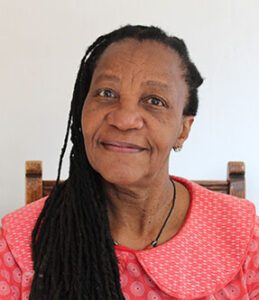
Rachel Makoni can be contacted on: psychologistrachelmakoni@gmail.com
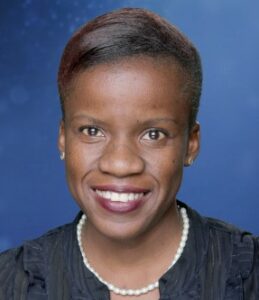
Acknowledgements
Original funding of Stardust was provided by Judy Davis and Nick Perren. Stardust continues to be funded by the late Nick Perren’s wife Roberta Perren.
References
- Music, G. (2018). Nurturing Children: From Trauma to Growth Using Attachment Theory, Psychoanalysis and Neurobiology. London. Routledge Press.
- Gerhardt, S. (2004). Why love matters: How affection shapes a baby’s brain. Routledge/Taylor & Francis Group.
- Dawson, N. (2022) Contextual Ghosts in the Nursery: Systemic Influences on Sensitive Maternal Responsiveness in a Low to Middle Income Country. Psychoanalytic Social Work, 29:1, 1-26, DOI: 10.1080/15228878.2021.1878044
- Puura, K., Malek, E., Berg, A. (2018). Integrating Infant Mental Health at Primary Health Care Level. WAIMH Perspectives in Infant Mental Health, 26, (2-3). Open source link: Integrating Infant Mental Health at Primary Health Care Level – Perspectives (waimh.org)
- Sroufe, L.A., Coffino, B., Carlson, E. A. (2010). Conceptualizing the Role of Early Experience: Lessons from the Minnesota Longitudinal Study. Dev Rev, Mar 1;30(1):36-51. doi: 10.1016/j.dr.2009.12.002. PMID: 20419077; PMCID: PMC2857405.
- *Currently, Section 18 of the Labour Act of Zimbabwe states maternity leave is granted for a period of 98 days on full pay to a woman employee who has served for at least one year and limits the number of periods of such leave to three by any one employer. Source: International Labour Organization.
- “Thula Baba” A South African Zulu lullaby meaning “Hush hush baby”. “Thula Baba” is sometimes called “Thula Thul”. It’s sometimes sung about the “father” or “little man” (using “baba” and “ubaba”), sometimes “mama”(using “mama” or “umama”). In some versions, you’ll hear “thula ntwana”, which means, “hush little child” (“prince” or “princess”). Source: https://www.mamalisa.com/?t=es&p=3183
Authors
Salisha Maharaj (South Africa)
June Manala (South Africa)
Rachel Makoni (South Africa)


